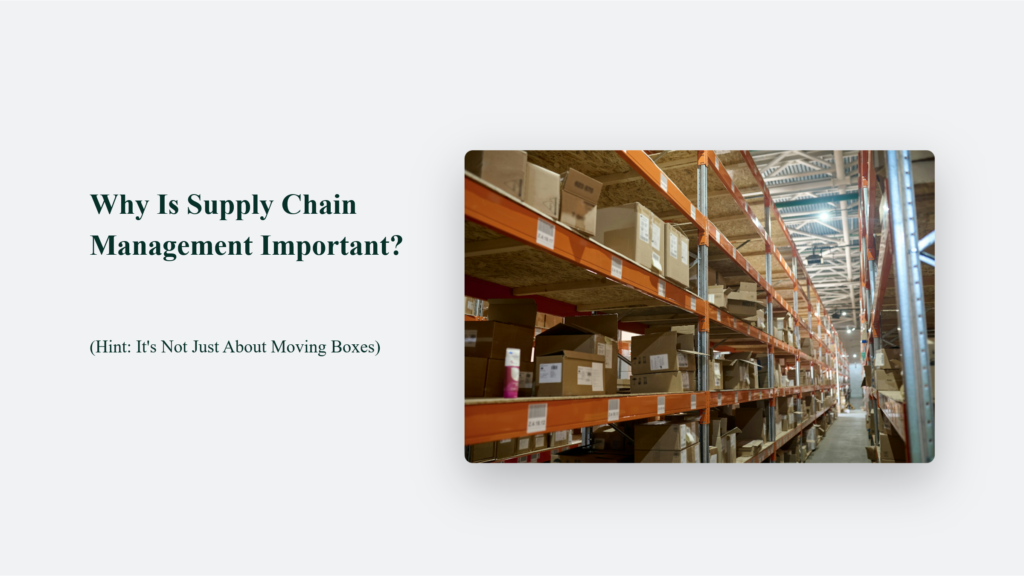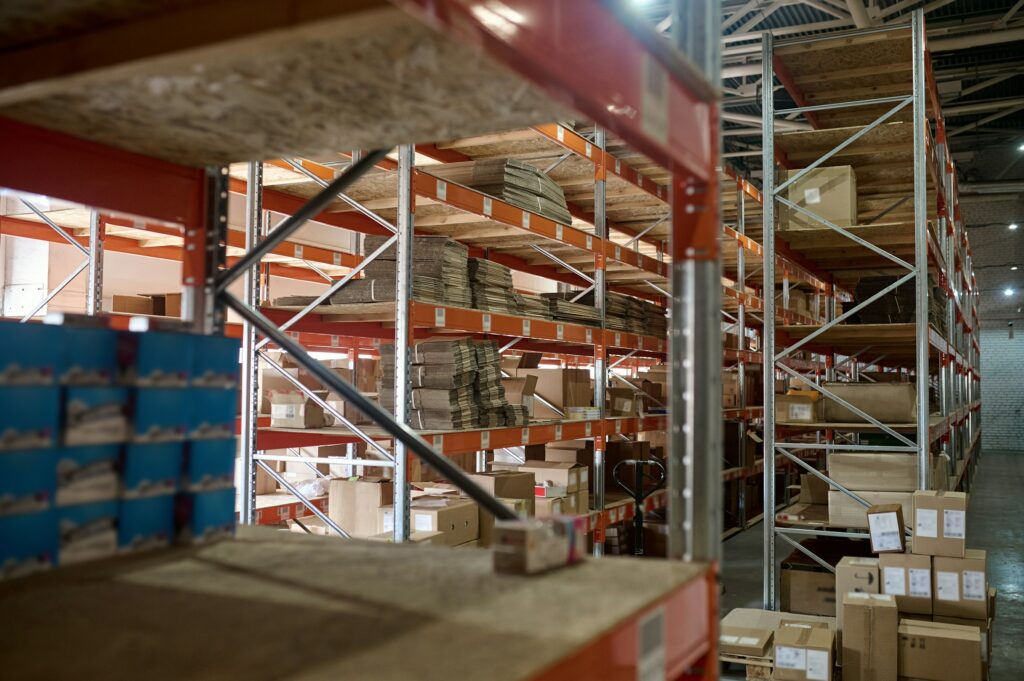Alright, let’s dive into the fascinating world of why is supply chain management important. But before we do, I want you to imagine something momentarily. Picture yourself standing in front of your fridge, reaching for that last slice of pizza you’ve been dreaming about all day. You open the box, and… it’s gone. Disappeared. Vanished into thin air. That feeling of disappointment? That’s what businesses experience when their supply chain fails. And trust me, it’s a lot more expensive than a missing slice of pizza.
Now, you might be thinking, “Konger, why are you talking about pizza when we’re supposed to discuss supply chains?” Well, my friend, that’s because understanding why supply chain management is important is a lot like understanding why that pizza matters to you. It’s all about getting what you need when you need it and making sure it’s still hot and delicious when it arrives.

The Not-So-Boring Truth About Why is Supply Chain Management Important:
Let’s cut to the chase: supply chain management is important because it’s the backbone of modern business. The invisible force ensures your favourite products are on the shelves, your online orders arrive on time, and businesses can operate efficiently. But here’s where it gets really interesting…
The Domino Effect: How Supply Chains Impact Everything
Imagine a world where supply chains didn’t exist. You’d be sitting there, twiddling your thumbs, waiting for raw materials to magically appear so you could start manufacturing. And once you’ve made your product? Good luck getting it to customers without a distribution network. It’s like trying to play Jenga with missing blocks – the whole thing falls apart.
Supply chain management is the glue that holds the business world together. It’s not just about moving products from point A to point B. It’s about orchestrating a complex dance of suppliers, manufacturers, distributors, and retailers. And let me tell you, it’s a dance that would make even the most seasoned choreographer sweat.
The Bottom Line Booster
Here’s something that’ll make your accountant’s heart skip a beat: effective supply chain management can significantly boost your bottom line. How? By reducing costs, improving efficiency, and increasing customer satisfaction. It’s like hitting the business trifecta.
But wait, there’s more! (I’ve always wanted to say that.) A well-managed supply chain can also:
- Reduce inventory costs
- Improve cash flow
- Increase production efficiency
- Enhance customer service
It’s like having a secret weapon in your business arsenal. And trust me, in today’s cutthroat business world, you need all the weapons you can get.
The Hidden Superpowers of Supply Chain Management
Agility: The Business Ninja Skill
Remember when the pandemic hit, and suddenly, everyone was panic-buying toilet paper? That’s when businesses with agile supply chains became the real MVPs. They were able to pivot faster than a cat on a hot tin roof, adjusting their operations to meet changing demand.
Supply chain agility isn’t just about reacting to crises, though. It’s about being able to adapt to any change in the market. New competitor? No problem. A sudden spike in demand? Piece of cake. It’s like having a crystal ball for your business, except it actually works.
Sustainability: Because Saving the Planet is Cool (and Profitable)
Here’s a fun fact for you: consumers are increasingly choosing brands based on their sustainability practices. And guess what plays a massive role in a company’s sustainability? You guessed it – supply chain management.
Supply chain management can significantly reduce a company’s environmental impact by optimising transportation routes, reducing waste, and sourcing responsibly. It’s like being able to save the planet and make money simultaneously. Talk about a win-win situation.
Risk Management: Because $#!% Happens
Let’s face it: the world is unpredictable. Natural disasters, political unrest, and global pandemics can all throw a wrench in your supply chain faster than you can say “stock shortage”. That’s where robust supply chain management comes in.
By identifying potential risks and developing contingency plans, businesses can weather the storm (sometimes literally) and come out on top. It’s like having a business umbrella that protects you from more than just rain.
The Future of Supply Chain Management: Buckle Up, It’s Going to Be a Wild Ride
AI and Machine Learning: The Rise of the Machines (But in a Good Way)
Picture this: supply chains that can predict demand, optimise routes, and manage inventory all on their own. No, it’s not science fiction – it’s the future of supply chain management, and it’s already happening.
AI and machine learning are revolutionising the way we manage supply chains. They’re like having a super-smart assistant who never sleeps, never takes a coffee break, and can process vast amounts of data in the blink of an eye.
Blockchain: Not Just for Crypto Bros Anymore
Blockchain technology is set to transform supply chain management by providing unprecedented transparency and traceability. Imagine being able to track every single component of your product from source to shelf. It’s like having X-ray vision for your supply chain.
The Internet of Things (IoT): When Your Fridge Talks to Your Supplier
IoT devices are creating interconnected supply chains that can communicate in real time. It’s like your entire supply chain is on one big group chat, sharing updates and solving problems on the fly.
The CJ&CO Approach: Where Supply Chain Magic Happens
Now, I know what you’re thinking. Casey, this all sounds great, but how do I actually implement effective supply chain management in my business?” Well, my friend, that’s where we come in.
At CJ&CO, we don’t just talk the talk – we walk the walk. We’ve helped businesses across Australia and beyond optimise their supply chains, boost their efficiency, and skyrocket their profits. How? By combining cutting-edge technology with good old-fashioned Aussie ingenuity.
Our approach is all about tailoring solutions to your specific needs.
We don’t believe in one-size-fits-all strategies. Instead, we dive deep into your business, understand your unique challenges, and craft a supply chain management strategy that fits you like a glove.
Whether you’re a small business owner trying to streamline your operations or a large corporation looking to overhaul your entire supply chain, we’ve got your back. We’ll help you navigate the complex world of supply chain management, avoid the pitfalls, and seize the opportunities.
The Final Slice: Why Supply Chain Management Matters More Than Ever
In today’s fast-paced, globally connected business world, supply chain management isn’t just important—it’s absolutely critical. It’s the difference between thriving and merely surviving, between being a market leader and playing catch-up, between delivering that perfect slice of pizza to your customer’s doorstep and leaving them hungry and disappointed.
So, the next time someone asks you “why is supply chain management important?”, you can tell them it’s because it’s the secret sauce that keeps the business world turning. The unsung hero ensures products get made, shipped, and delivered. It’s the ninja in the shadows, silently optimising operations and boosting profits.
And if they still don’t get it? Well, you can always invite them over for pizza. Just make sure you’ve got a good supply chain in place first.
Frequently Asked Questions:
How can I make my supply chain more sustainable?
Great question! Sustainability is becoming increasingly important in supply chain management. Some strategies include:
– Optimising transportation routes to reduce emissions
– Sourcing materials from sustainable suppliers
– Implementing recycling and waste reduction programs
– Using eco-friendly packaging
– Investing in energy-efficient technologies
Remember, a sustainable supply chain isn’t just good for the planet – it’s good for your brand image and often your bottom line too.
How do I know if my current supply chain management is effective?
A: There are several key performance indicators (KPIs) you can look at:
– Order fulfillment rates
– Inventory turnover
– On-time delivery
– Total supply chain costs
– Customer satisfaction levels
If these metrics are trending in the right direction, you’re on the right track. If not, well… that’s where we come in.




